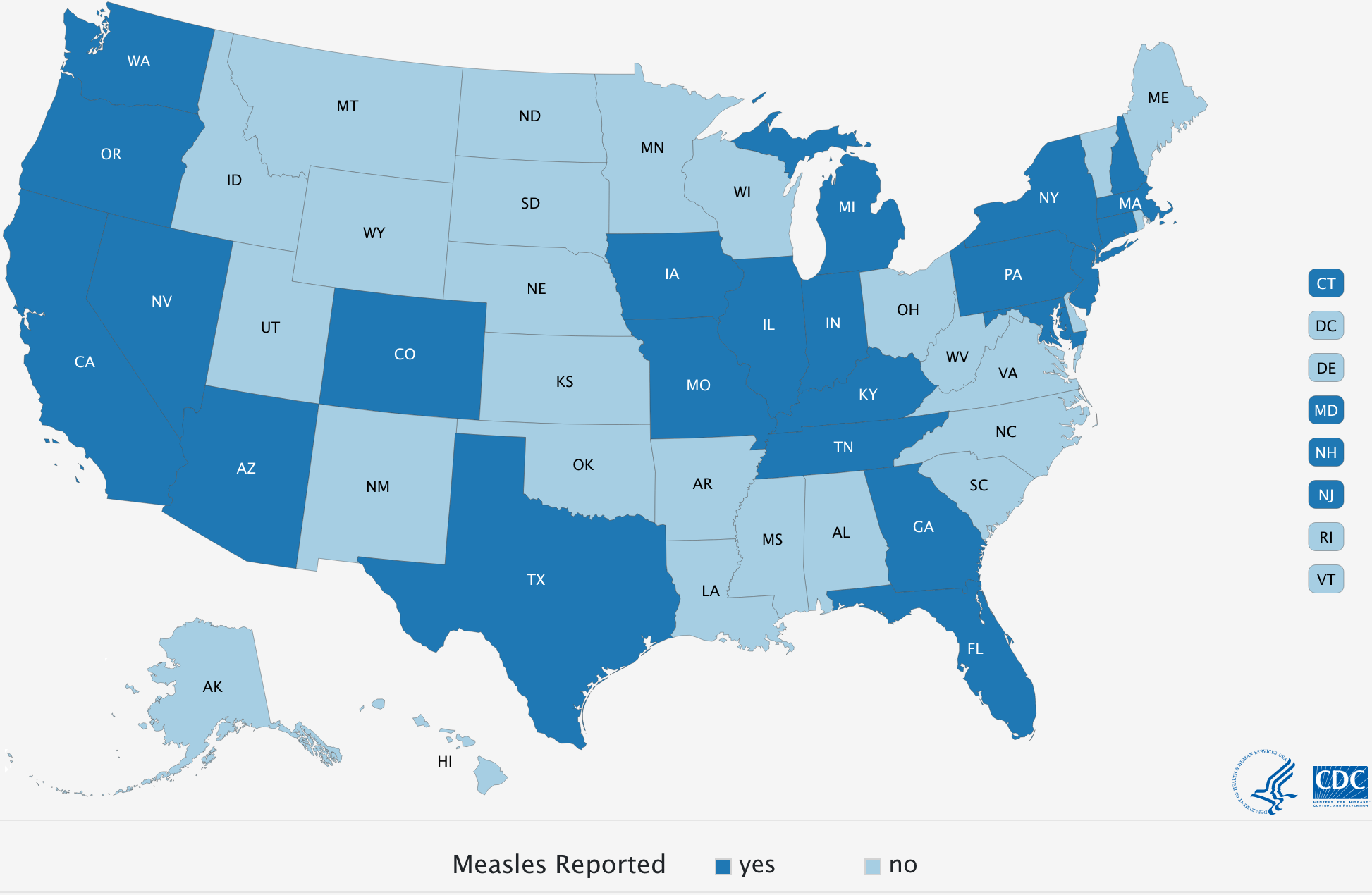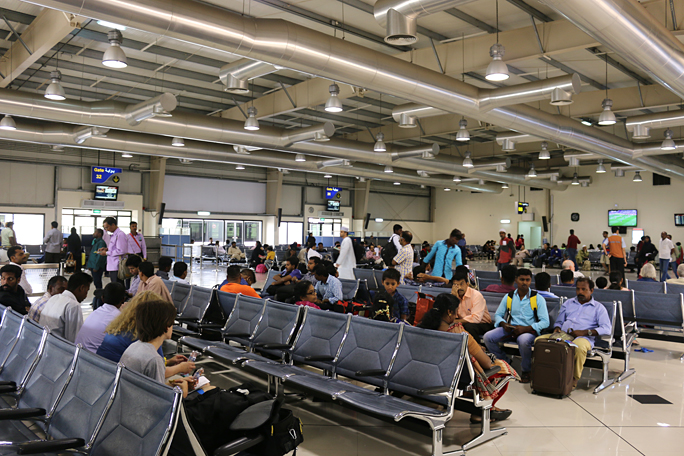“From January 1 to May 10, 2019, 839 individual cases of measles have been confirmed in 23 states. This is an increase of 75 cases from the previous week. This is the greatest number of cases reported in the U.S. since 1994 and since measles was declared eliminated in 2000.”
Should You Be Vaccinated For Measles When Traveling This Summer?
That statement which you just read was issued by the Centers for Disease Control and Prevention in Atlanta pertaining to the measles outbreak in the United States in 2019 — and those 23 states are as follows:
- Arizona
- California
- Colorado
- Connecticut
- Florida
- Georgia
- Illinois
- Indiana
- Iowa
- Kentucky
- Maryland
- Massachusetts
- Michigan
- Missouri
- Nevada
- New Hampshire
- New Jersey
- New York
- Oregon
- Pennsylvania
- Texas
- Tennessee
- Washington

Measles is a very contagious disease which is caused by a virus that spreads through the air when an infected person coughs or sneezes. Soon after starting with a fever, measles causes coughing, a runny nose, and red eyes — followed by a rash of tiny, red spots which break out. Starting at the head, measles then spreads throughout the remainder of the body.
Although the current measles outbreak in the United States is the most significant in 25 years, the Centers for Disease Control and Prevention is concerned about people who travel internationally, as the outbreaks in the aforementioned states are linked to travelers who brought measles back from other countries where large measles outbreaks are occurring — such as Israel, Ukraine, and the Philippines.
People who are at risk for severe illness and complications from measles include — but are not limited to:
- Infants younger than 12 months of age
- Pregnant women without evidence of measles immunity
- People with severely compromised immune systems
Recommendation: International Travelers Should Be Vaccinated…
If you or someone you know is six months of age or older who will be traveling internationally, you should consider receiving the Measles, Mumps, and Rubella vaccine in order to protect yourself against measles prior to any international travel, according to this article from the Centers for Disease Control and Prevention — especially if you are one of the people who are at risk when contracting measles, which includes:
- Infants 6 through 11 months of age should receive one dose of Measles, Mumps, and Rubella vaccine. Infants who get one dose of Measles, Mumps, and Rubella vaccine before their first birthday should get two more doses — one dose at 12 through 15 months of age and another dose separated by at least 28 days.
- Children 12 months of age and older should receive two doses of Measles, Mumps, and Rubella vaccine, separated by at least 28 days.
- Teenagers and adults who do not have evidence of immunity against measles should get two doses of Measles, Mumps, and Rubella vaccine separated by at least 28 days.
…But You Should Not Be Vaccinated If…
You should not consider receiving the Measles, Mumps, and Rubella vaccine — or you should at least wait until you consult with your vaccine provider — if you:
- Have evidence of immunity against measles.
- Have any severe, life-threatening allergies. A person who has ever had a life-threatening allergic reaction after a dose of Measles, Mumps, and Rubella vaccine — or has a severe allergy to any part of this vaccine — may be advised not to be vaccinated. Ask your health care provider if you want information about vaccine components.
- Are pregnant, or think you might be pregnant. Pregnant women should wait to get Measles, Mumps, and Rubella vaccine until after they are no longer pregnant. Women should avoid getting pregnant for at least one month after getting Measles, Mumps, and Rubella vaccine.
- Have a weakened immune system due to disease — such as cancer or HIV or AIDS — or medical treatments such as radiation, immunotherapy, steroids, or chemotherapy.
- Have a parent, brother, or sister with a history of immune system problems.
- Have ever had a condition that makes them bruise or bleed easily.
- Have recently had a blood transfusion or received other blood products. You might be advised to postpone Measles, Mumps, and Rubella vaccination for at least three months.
- Have tuberculosis.
- Have gotten any other vaccines in the past four weeks. Live vaccines given too close together might not work as well.
- Are not feeling well. A mild illness, such as a cold, is usually not a reason to postpone a vaccination. Someone who is moderately or severely ill should probably wait. Your doctor can advise you.
Evidence of Immunity Against Measles
Acceptable presumptive evidence of immunity against measles includes at least one of the following:
- Written documentation of adequate vaccination:
- One or more doses of a measles-containing vaccine administered on or after the first birthday for preschool-age children and adults not at high risk
- Two doses of measles-containing vaccine for school-age children and adults at high risk, including college students, healthcare personnel, and international travelers
- Laboratory evidence of immunity
- Laboratory confirmation of measles
- Birth before 1957
Healthcare providers should not accept verbal reports of vaccination without written documentation as presumptive evidence of immunity.
Summary
One reason why the measles outbreak is significant is because some people do not believe in vaccinations for health or religious reasons; while others have brought the disease to the United States from other countries…
…but in the years since the national measles vaccination program was implementing in the United States in 1963, many people have been vaccinated through the 1970s and are not at risk for contracting the disease. Furthermore, the disease itself is generally not fatal for 99.9 percent of people who contract it: of the approximately 500,000 persons with measles which were reported each year in the United States prior to 1963, fewer than 10 percent were significantly affected adversely overall: 500 fatalities occurred; 48,000 people were hospitalized; and another 1,000 of them experienced permanent brain damage from measles encephalitis.
Still, if you have not been vaccinated for the disease and plan to travel — even within the aforementioned areas of the United States — you may not want to take any chances. Consider receiving the Measles, Mumps, and Rubella vaccination for your own protection — as well as for the protection of others.
Photograph ©2015 by Brian Cohen.

